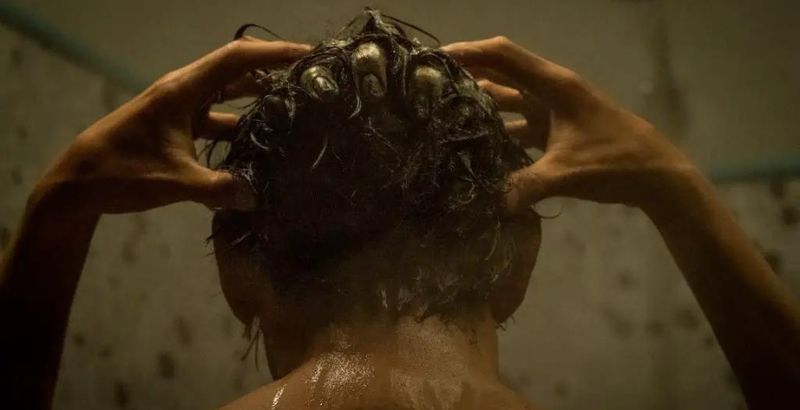
Takashi Shimizu’s Ju-On: The Grudge is iconic for both helping establish modern Japanese horror (J-horror) cinema and being one of the influential films that put a spotlight on foreign horror in the United States. A staple in the horror pantheon and J-Horror’s Kaidan subgenre, Ju-On is ever-present even today. Now, like most iconic stories, it’s being added to by an American studio for a second time with writer-director Nicolas Pesce at the helm.
In Pesce’s The Grudge, the story begins when a young mother murders her family after returning from Tokyo. Through interconnected stories focused on their home, we learn about the haunting—the curse—through Detective Muldoon (Andrea Riseborough), a single mother dealing with the loss of her husband. When Muldoon moves to a new town, she takes on the cases revolving around the home as she tries to solve them with her new partner—and the only person with any common sense—Detective Goodman (Demián Bichir). Muldoon soon discovers that the vengeful ghost (or ghosts?) dooms those who enter the home with violent death and she struggles to free herself from its grip.
Moved entirely to the United States, The Grudge has some basic connections to Shimizu’s original and his 2004 American addition to the franchise. Starting in Tokyo in 2004, the film features tiny moments that connect it to the lineage and timeline of the original Japanese film. Additionally, Pesce tells the story through vignettes, though not as sympathetically as the original did. Additionally, there are Easter eggs that existing fans of the franchise will notice, but that’s where the connections stop.
The Grudge tells five different stories that are connected not through their tragedy but the building that facilitates it. At first glance, this mimics the haunting in Shimizu’s original film which seems rooted to the house. That said, the reason that J-horror ghost stories (Kaidan) work so well is because they aren’t just about evil for evil’s sake. Instead, they are about the trauma that caused the curse. While we see the death of those the vengeful spirits touch, we learn of their pain, their creation, and the arc that makes them sympathetic and not just frightening. Sadly this isn’t the case in Pesce’s take.
In Pesce’s attempt to join the franchise, we see the start of the curse in the United States but it’s not grounded in something emotive or personal. Instead, we get an imitation of Kayako and Toshio’s murders that don’t come from reality but are influenced by a globetrotting ghost. By focusing on recreating Kaidan visuals and sound design, The Grudge doesn’t take time to build a path of empathy to its characters, which continues the trend of horror remakes missing the point of the originals they’re based on.
Moving through the different stories within the film is done so quickly that as a viewer, you’re unable to connect with any of the characters in a meaningful way. With so many actors that completely pull you into their scenes like John Cho, Lin Shaye, and Riseborough, it’s frustrating that when tragedy befalls them the emotional impact is negligible. Cho as Peter is a loving soon-to-be father who is dealing with news about his wife’s pregnancy. Shaye and Frankie Faison as a married couple, Faith and William, deliver the start to an emotional story with the two of them dealing with illness. William is losing his wife and Faith is in control of the ghosts. Truthfully, Shaye’s acting is the most disturbing and eye-catching while Cho and Faison bring the only emotion in the film, while Riseborough is intriguing, dealing with her grief while also moving through a noir storyline.
I wanted to see more of each of these character’s stories but when the story shifted right as I was falling in, it pushes you out of them. The way the film jumps from one to the next creates a jarring experience at first and a boring one by the end. The importance of landing scares and horror, in general, goes beyond jump scares and cinematography. Horror lives on a foundation of empathy; it calls for us to see ourselves in the characters, to root for them, and to feel their fear and their hope. By having an extensive cast and not executing the film’s transitions from vignette to vignette, The Grudge ignores that foundation. Now, this isn’t to say that the film doesn’t feature great performances. Each individual tale of woe is centered on intriguing characters, with actors who bring the most they can to their moments.
Much like 2019’s Black Christmas before it, The Grudge suffers because of its link to an existing horror juggernaut. That being said I’m unsure if it could stand on its own either because of these issues. The biggest shame is that Pesce is a wonderful director who had such a strong feature debut with The Eyes of My Mother. Overall, The Grudge is a disappointing start to horror in 2020. A shell of the ones before it, a more focused story could have helped the visually interesting film.
All of that said, if you’re looking for a revisit of 2002’s The Grudge, check out Shudder’s Sadako VS Kayako, and if you’re looking for a journey in Japanese horror cinema from an American perspective, The Terror: Infamy is a go-to series to fill that spot.
The Grudge (2020) is playing nationwide.
Th Grudge (2020)
-
Rating - 3/103/10
TL;DR
Much like 2019’s Black Christmas before it, The Grudge suffers because of its link to an existing horror juggernaut…The Grudge is a disappointing start to horror in 2020. A shell of the ones before it, a more focused story could have helped the visually interesting film.






